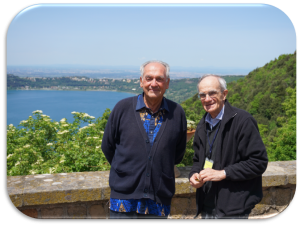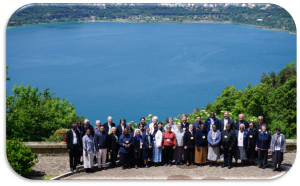The 2024 SEDOS Residential Seminar proved to be a CALL to prophetic witness and courage, an urgent call, because what is at stake is nothing less than life itself, life on the planet, life of humanity, the life of all of us.
We started our five days together at Ariccia by exploring, reflecting on the Seminar’s theme which had the following three elements: “Prophetic witness for universal communion, Mission in conflict zones and healing”. With the help of official texts of the Church we were reminded of the mission of the Church which is to further, by God’s grace, universal communion with God and universal sisterhood and brotherhood as we all are created in the image of God, all children of God, of the one Father of all (Eph 4). Sharing in this mission of the Church is at the heart of our missionary vocation as consecrated people who walk in Jesus’ footsteps as missionary disciples and continue His ministry of compassion, healing and freedom. Each institute does so with creative imagination and in fidelity to its own charism under the guidance of the Holy Spirit.
Having revisited our “principle and foundation”, we listened to the various Speakers who were quick to challenge us as they shared their own experiences and bore personal witness to their commitment and courage, to their deep human compassion and their practice of dialogue and truth, justice and peace. We understood then that this Seminar was to be a wake-up call. It became a threefold call:

A call to change the paradigm: from a Church to a Kingdom centered mission on to LIFE itself, the one value; to a cosmic, global and universal stand safeguarding and enhancing life, the survival of the planet, our common home, the survival of humanity. Mission is about humanity and humanizing, about our shared humanity, about the “we”, in an approach both personal and inclusive seeking to communicate and to uphold the dignity of every human being while joining up and cooperating with all churches, religions, philosophies of life. One of the Speakers put it this way: Mission is to be at the service of life; what you humanize, God divinizes. He insisted on prayer, on being rooted in the contemplative dimension of life and on reaching out to every person in simplicity and in truth. Further, we were referred to Pope Francis’ Encyclical Letter Fratelli Tutti and to Martin Luther King, Jr, who said: We must learn to live together as brothers or we will all perish together as fools.
The second call is the call to non-violence, to active non-violence. We were reminded that we are born into a violent world and that violence is present in all of us. To become non-violent is something we have to learn. We were helped to look at how Jesus practiced active non-violence and explored some of His teaching and parables. We were invited to start “disarming” our talking, our gestures, our looks! Here follow some of the points the Speakers mentioned: change your vocabulary, promote a culture of non-war, of peace; speak out and tell the truth concerning the causes of conflict and strife, the injustices or exploitation taking place; talk about alternatives to violence and encourage alternative narratives; seek contact and dialogue with opposing groups and factions; listen to their grievances, aspirations and needs; be at the service of the truth; rely on personal and community prayer.
The third call is to become familiar with the ways and means used by others such as the Jesuit Refugee Service (JRS), Pax Cristi and others, and to discern on the level of the community, the parish, the congregation/-institute or diocese which launch new projects in fidelity to the institute’s respective charism. Here are three short extracts taken from the papers presented during the Seminar:
Inspired by the compassion and love of Jesus, JRS is dedicated to accompanying, serving, and advocating for refugees and forcibly displaced individuals, empowering them to heal, learn, and determine their own future. Our approach is holistic, addressing psychosocial well-being, gender responsiveness, safeguarding, community empowerment, and environmental stewardship as key factors for rebuilding lives and preserving dignity.
Pax Christi is convinced that in the long run, the only way to make the thought of sustained peace seriously possible, the only way to follow Merton’s plea is by embracing Gospel nonviolence… Nonviolence is not the same as pacifism. It is a spirituality, a way of life, an ethic that is potentially universal, and a proven, often-effective approach to preventing or interrupting violence, to protecting vulnerable people and the planet, to promoting just peace. Non-violence is not passive. It does not retreat from conflict. It actively engages and transforms conflict and is a courageous force for mercy and reconciliation.
The Integrity for Nonviolence Program promotes four basic values and behavior patterns:
Creating respect: Acceptance of person; being a non-threatening place
Practicing honesty: Open and truthful communication; freedom to discover the true self
Promoting justice: Accountability and responsibility; negotiation and fairness
Nurturing wholesome relationships: Demonstrate trust and support; have adequate resources.



